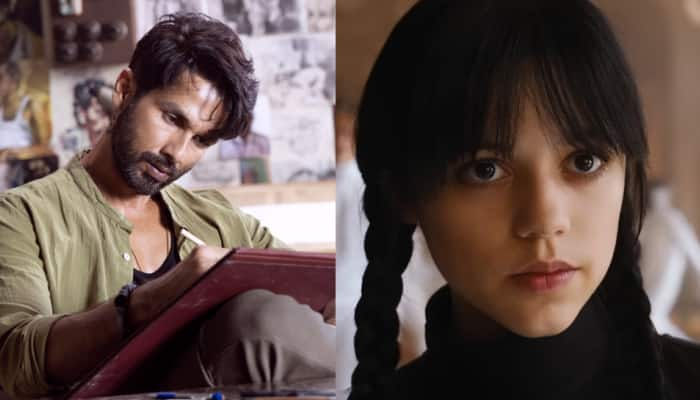Idea of India and Bharat: An exchange between Shashi Tharoor and J Sai Deepak
Dr. Tharoor took part in a discussion with J Sai Deepak, who himself had recently launched his own book ‘India that is Bharat’ (as said in Article 1 of the Constitution).
- Dr. Tharoor took part in a discussion with J Sai Deepak, who himself had recently launched his own book ‘India that is Bharat’.
- Dr. Tharoor said it was his personal meditation on Nationalism and how the idea applies in the Indian context.
Trending Photos
)
Chennai: It was an enlightening exchange of ideas, ideologies, belief systems and facts like no other - renowned Author, former International Diplomat and Parliamentarian Dr. Shashi Tharoor on one end and famed Supreme Court Advocate, Best-selling Author on debut J Sai Deepak on the other. In Chennai to launch his latest book, ‘The Battle of Belonging’, Dr. Tharoor took part in a discussion with J Sai Deepak, who himself had recently launched his own book ‘India that is Bharat’ (as said in Article 1 of the Constitution). As the session moderator, Dr. Nanditha Krishna, President CP Ramaswamy Aiyar Foundation, set the tone and expectations high by indicating how the respective author’s books were antithetical to each other.
Elaborating on his latest work, Dr. Tharoor said it was his personal meditation on Nationalism and how the idea applies in the Indian context. His work delves deep into Global literature on Nationalism and belonging, the kinds of Nationalism, the thin line between Nationalism and Patriotism. He explained that, Patriotism is love for your country such that you belong to it and it belongs to you, like a mother’s love. “A Patriot loves the country in an uncritical way, even if there's nothing appealing about it to a stranger. Nationalism is the idea of a country that is represented as state, flag, army, ruling ethos and a Nationalist defines allegiance and opposition to others. While the two may seem fairly similar, the difference is that - a Patriot is prepared to die for his country; a nationalist is prepared kill for his state,” he distinguished.
However, he also touches upon the Nationalism linked to identity (birth, blood, religion) and also Civic nationalism that is not anchored in identity (which is anchored in Constitutions and institutions and implies voluntary participation in Civic society). Regarding Indian Nationalism, Tharoor said that it was a Civic Nationalism, as India’s freedom struggle was meant for everyone. Referring to the discussions during the formative stages of the Indian Constitution, Tharoor said that India was meant to be a Civic Nationalism of equal rights. He added that the idea of India guaranteed people Freedoms of Religion, Worship, Expression, Propagation of religion and Equality of citizens, irrespective of their differences. Tharoor also went on to mention an alternative idea of India - Hindi, Hindu, Hindustan, where the Indian Constitution had to be written for the Hindu people, instead of for all(which he attributes to Savarkar, Golwalkar and Deen Dayal Upadhyay).
ALSO READ | What a delightful personality, writes Shashi Tharoor after meeting Mahesh Babu
Sai Deepak started off by saying that his own book was an inadvertent rebuttal to Tharoor’s book. He corrected Tharoor regarding the proposition that the term and idea of Hindutva were coined by Savarkar. Instead, he said Chandranath Basu in 1892 had coined the term and elaborated on it, via an essay on Hindutva. He added that a school of thought approached Bharat’s experience of colonialism and ignored the scholarship of decoloniality. “The idea that Hindu Nationalism is fundamentally exclusionist and comes at the peril of religious minorities in India, is to impose the guilt and framework on European Nationalism on Bharatiya Consciousness,” he said. Deepak said that he prefers the term “Bharatiya Dharmic Civilizational reawakening” rather than Hindutva or anything of that kind. He adds that it is possible to discard Savarkar, to build a case for Dharmic Civilizationalism, as it was larger than any individual.
Speaking on how the Indian Constitution was portrayed as fundamentally antithetical to the Hindutva vision of a Hindu Rashtra, Deepak touched upon how the draft Constitution presented by Hindu Mahasabha granted equal rights to religious minorities. “Assuming we did not have the concept of contemporary Constitutionalism emanating from Europe, Bharat has always welcomed those who are willing to live with us. We did not have a Constitution when persecuted Parsis or Jews knocked at the doors of Bharat” the lawyer said. He also cautioned Tharoor against committing the grave injustice of attributing large-heartedness to the Constitution, at the expense of the Civilization. Deepak also took on those that make the allegation of India becoming a “Hindu Pakistan”. He went on to say that despite the horrors and tragedy of Partition, foisted two-nation theory, Bharat has protected its minorities, much much better than Pakistan. “Accommodation has been the spirit of this country, whereas Western style assimilation requires you to covertly or overtly convert to be accepted. It is Bharat that lets people keep their culture alive in a pristine form, so long as it doesn’t come in the way of others,” he said. He opined that ‘Dharmic Civilizationalism’ was being crudely dubbed as ‘Hindu nationalism’.
Referring to the Constituent Assembly debates, the lawyer recalled that whenever the term ‘public morality’ was used in the debates, the reference has been to public morality drawn from the vast Ocean of Dharma. He added that the concept of Dharma was native to Bharat and its culture. Deepak also disagreed and condemned the manner in which, what he called ‘Hindu awakening’ was being termed by many as ‘identity politics’. It is a superficial way of looking at it, he said, he further added that, there is a clear difference between identity and consciousness - of which consciousness is more important. “Choosing between Aurangzeb and Dara Shikoh(heir apparent of Shah Jahan), I would choose Dara Shikoh because he was closer to the Hindu spirit in terms of his consciousness, as opposed to Aurangzeb who was against the Hindu accommodative spirit.” Deepak also countered those who term Hindutva as ethnocentric and obsessed with race and Xenophobia (all of which are obsessions of European nationalism), by saying how Bharat accommodated many races. “They have come from several parts of the world, but became part of this land as they found a way of co-existing with us, without seeing us as sub-human or de-human. Anyone who is willing to let go of the tenet of rendering me a second-class human and severing my roots to this land, is welcome in this country,” he states.
ALSO READ | Shashi Tharoor smashing a coconut is a hit meme now, check out the best ones
Tharoor replied by saying that he had no difficulty with the notion of Dharmic Civilizational roots of India, but he would rather follow the Swami Vivekananda view of Hinduism, than that of Savarkar and his follower (ruling BJP). “Vivekanand was proud of Hinduism, but he celebrated the inclusiveness of the faith,” Dr. Tharoor said, highlighting how Swami Vivekananda spoke about the mutual respect that people of different faith have for each other’s truth. The Parliamentarian representing the Congress also spoke about the violent crimes against Dalits, Muslims and said he believed it wasn’t Dharmic.
Referring to Swami Vivekananda’s Hinduism (and Tharoor’s endorsement of that Hinduness), Deepak retorted that while Vivekananda echoed Universalism at Chicago, he also believed the Universalism cannot come at the cost of pixelation of history. Quoting from Swami Vivekananda’s books, Deepak said that “Swami Vivekananda himself (despite promoting Universal Brotherhood) was forced to hold a Christian Missionary by the collar and threatened to throw him off the ship, for spewing venom on Hinduism(what the Missionary called religion of Satan)”. According to Deepak, this act was Hindutva or Hindu Resistance in Action. “I am more than happy to accommodate your points, provided you stop spewing venom against me in the name of your scripture,” Deepak added. Referring to instances of violence against minorities, Deepak pointed out the silence on the issues of Kashmiri Hindus and that of post-poll violence after West Bengal elections, religious pockets being created in Assam, Nagalim for Christ etc. “With all these insurgencies going on, surprisingly, it is the Hindu who is the constant subject of scrutiny, whereas everybody else is spared scrutiny,” Deepak said.
Referring to ideas of Nationalism, Deepak said that the Nationalism of the European Colonizer (oppressor) could not be compared with the Nationalism of the victim and oppressed (Indian). On the Indian Constitution, he quoted Dr. Ambdekar on how he rued having created it (based on how it was being distorted under the Nehruvian dispensation).
In his concluding note, Dr. Tharoor touched upon how Secularism (in its Indian context) meant profusion of religion/pluralism, rather than the dictionary meaning of distancing from religion. He also added how he agreed with Vivekananda on refusing to be insulted. “Uncritical defence of bad behavior in the name of Hindutva and the whataboutery that says we have done bad things, but those guys have done bad things as well, is not the idea. Our duty as Indians is to reform ourselves. As a Hindu, I would have every entitlement to judge fellow Hindus, when they fall short of Dharmic standards, but it’s not my duty to tell the same about Muslims or Christians and their religion. I can only tell them only how to be a good citizen under the Constitution. I will continue to criticize Hindus when they misbehave. I think that there has to be some common ground between these views and that of the Government and the Opposition” he said. He also added that, given India’s diversity, people needn’t agree all the time, as long as they agreed on the ground rules of how they will disagree (as established in the Constitution), without challenging the Fundamentals of the Constitution.
In her summation, Dr. Nanditha Krishna said that India needed a Truth and Reconciliation Commission where people sat across the table and discussed their problems with each other and solved them. Dr. Tharoor then stated that India’s problems were with injustices done over 500 years ago, only for Deepak to intervene and say that they were continuing injustices. Dr. Krishna added that rather than fighting for issues that date back 1000s of years, the country needed to focus on the coming 1000 years, to which Deepak agreed that it was better resolved on the table than the street.
Dr. Tharoor added that the focus must be on the future rather than past wrongs. He admitted that there were many wrongs done, but that they weren’t done by people living today. Building on Dr. Tharoor’s point(of an in-principle apology for Colonial horrors, as against money), Deepak said that that same was expected from other people for what happened in parts of India. “Reparatory Justice is finding traction across the world, we are only asking for reconciliation, where we accept and move on so that it’s not repeated” Deepak signed off.
Stay informed on all the latest news, real-time breaking news updates, and follow all the important headlines in india news and world News on Zee News.
Live Tv







)
)
)
)
)
)
)
)
)
)

